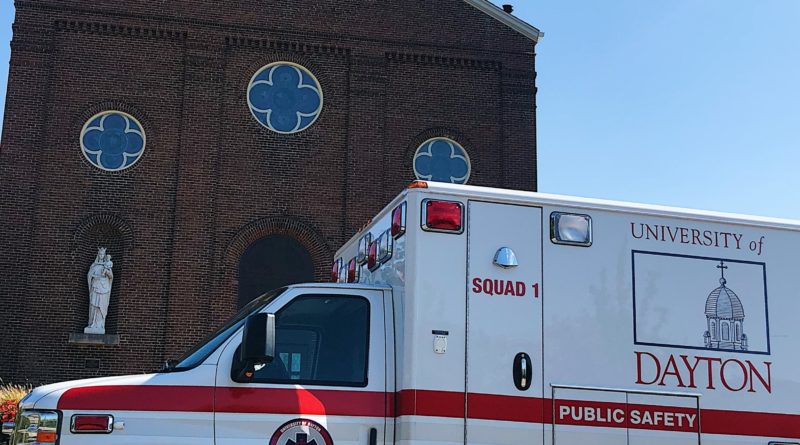New EMS leadership excited to serve fellow students
Next year’s leaders of the Emergency Medical Services squad share their excitement to serve the student neighborhood.
Grace Dipierro
The University of Dayton has many unique opportunities for students. One such opportunity is the chance to participate in UD’s Emergency Medical Services (EMS).
EMS is a student-run and volunteer-based organization that provides a free 24/7 ambulance service for the UD community.
UD students apply to be a part of EMS and through a selective application process, a certain number of officers are admitted each year. Members of EMS can also run to be elected for a leadership position. In March, EMS held elections for their newest officer group.
Junior health sciences major Clay Hepp is the new Chief of EMS. Hepp wanted to be involved in an organization that serves the UD community, so EMS was a perfect fit.
“Our motto of students helping students is really something cool, and it was definitely one of the biggest reasons that I wanted to get involved with EMS,” Hepp added.
Hepp’s main responsibility as the Chief is acting as a liaison between EMS and Public Safety, as well as between University administration and Miami Valley Hospital. Hepp oversees the other officers, finances and generally ensures that EMS can run 24/7.
Hepp was interested in becoming the Chief of EMS because he wanted to “sacrifice time for the betterment of the organization and I felt I could really do that well as Chief.”
Bailey Cox is also a member of the EMS leadership team. Cox is a pre-medicine major with minors in medicine and society and neuroscience. Cox is the new Assistant Chief of Operations (ACO) for EMS. Cox joined EMS because he wanted to find a happy medium between clinical experience and engaging in service.
Another motivation for Cox was that he “wanted to forge relationships with people who are like minded in many aspects, and EMS allowed me to meet a lot of people I would not necessarily have met.”
Cox’s position as ACO involves managing any issues that come up in the EMS house, the ambulance or writing charts. Cox is also responsible for making sure officers are following certifications and licenses.
Junior health sciences major Abigail Shahady has taken on the role of Assistant Chief of Personnel (ACP) this year. Shahady originally joined EMS for many of the same reasons as Hepp and Cox, namely to find healthcare experience in college mixed with service.
Shahady’s role as ACP entails anything related to members and personnel, such as recruitment, outreach and enforcing accountability.
EMS is typically dominated by students majoring in a health field like pre-med, pre-PA or nursing, but Shahady explained that you don’t need to have a specific major to be in EMS.
“Our services aren’t just for students in the health sciences, so our members shouldn’t just be health sciences,” Shahady said.
Cox reflected on the personal impact EMS has had on him, noting the family aspect provided by the EMS community.
“When you’re in the back of the ambulance, it’s not just 2 or 3 EMTs,” Cox said. “It is whoever you’re with, like Abby, Clay and Bailey.”
Looking forward, one of Hepp’s goals is to create “an atmosphere of transparency and clear communication” that is vital to the efficiency of their organization.
Shahady is focused on outreach for recruitment as well as to educate the general public about EMS.
“We want to make sure we are seen as the helpful service organization that we are designed to be,” Shahady said.
Shahady expressed that volunteer positions can be difficult because “you’re not really under any obligation to handle what comes across your desk, but you’re also under more of an obligation because this is a service organization first and foremost.”
EMS has also stepped up during the COVID-19 pandemic by providing COVID-19 transports.
“We really enjoy that we can be there for others in a time of need, and we hope we can keep finding ways to give back, especially as people get vaccinated,” Cox commented.
Hepp, Cox and Shahady agreed that even though the position takes a lot of time and effort, it is worth it.
One important takeaway that the EMS leadership emphasized was the idea of medical amnesty, which is especially for incoming first year students to know about.
“In any type of situation where you think someone needs help, do not hesitate to call EMS,” Hepp said. “We aren’t here to get anyone in trouble.”
Hepp highlighted that “we are students, too. We are understanding of situations and we want to be there to help.”
For more campus news, like Flyer News on Facebook and follow us on Twitter (@FlyerNews) and Instagram (@flyernews).

